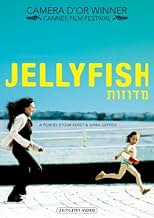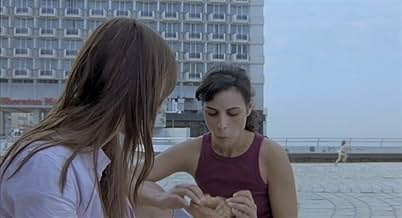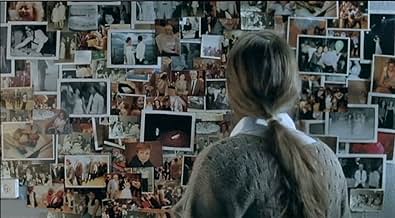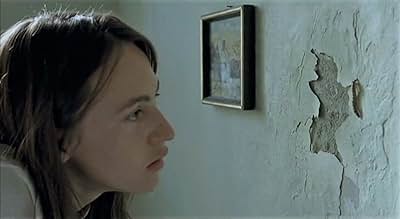IMDb RATING
7.0/10
2.8K
YOUR RATING
Intertwined destinies of characters who seek to break free from their solitude and find their place in society. Slowly, they manage to stay afloat and let themselves be carried along by life... Read allIntertwined destinies of characters who seek to break free from their solitude and find their place in society. Slowly, they manage to stay afloat and let themselves be carried along by life.Intertwined destinies of characters who seek to break free from their solitude and find their place in society. Slowly, they manage to stay afloat and let themselves be carried along by life.
- Awards
- 5 wins & 14 nominations total
Ma. Nenita Flores Dela Torre
- Joy
- (as Ma-nenita De Latorre)
- Directors
- Writer
- All cast & crew
- Production, box office & more at IMDbPro
Featured reviews
Not quite sure how to describe this movie other than it captures the daily frustrations of Israeli life and the mystery that can befuddle anyone in their daily life, young or old.
All movies normally have a bit of glass between the viewer and the actors/actresses. This movie seems to dissolve that. A very strange phenomenon. But you feel more connected to the people on the screen. Like they are right before you. The only exception would be those moments that seem like dream sequences, but are all too real... or rather surreal.
I started out watching this movie to pick up a little bit of hebrew and soak up some of the sights of Tel Aviv. I am happy that I did. The scenes are very accurate. I especially liked one scene involving a taxi driver, a cat and some other key details that will amuse anyone who has spent time in Israel.
I got much more from this and plan to bring this movie to my parents house for mother's day. I hope they will enjoy it as much as I did.
All movies normally have a bit of glass between the viewer and the actors/actresses. This movie seems to dissolve that. A very strange phenomenon. But you feel more connected to the people on the screen. Like they are right before you. The only exception would be those moments that seem like dream sequences, but are all too real... or rather surreal.
I started out watching this movie to pick up a little bit of hebrew and soak up some of the sights of Tel Aviv. I am happy that I did. The scenes are very accurate. I especially liked one scene involving a taxi driver, a cat and some other key details that will amuse anyone who has spent time in Israel.
I got much more from this and plan to bring this movie to my parents house for mother's day. I hope they will enjoy it as much as I did.
This film is showing at the Maine Jewish Film Festival in April and I was fortunate enough to see it early. The film is a unique offering from Israel where you do not often see poetic films like this. The acting is excellent, too. The story may be a bit abstract for some and others may think it is a bit derivative. But all art derives from life or reflections of life and this film is a wonderful look into the lives of these women and a mysterious little nymph from the ocean who wears a float ring. Well worth the awards garnered so far: Cannes Film Festival,Bratislava International Film Festival, and Israeli film Academy. A movie worth seeking out!
The female heart is shared through four, perhaps five female roles, and a token male. I say token because, perhaps like in the lives of all women as they compete with one another yet strive mutually for acceptance, men can often be little more than an accessory. Here the hopes, pains, and disappointments of wives, mothers, daughters, and career women are shared in a very poetic and imaginative way. Wonderful cinemoatography. The use of setting is especially effective.
9Nozz
Ilan Shaul of the Hebrew weekly ANASHIM has a good take on the title, which means "jellyfish." Like jellyfish, the film's characters do not control their direction but are pushed here and there by chance; and like jellyfish, they mindlessly sting.
Dostoevsky-- at least according to one of the characters-- could get his writing done anywhere; nothing distracted him. In MEDUZOT, it sometimes seems impossible that anyone could ever get anything done, so strong are the buffetings of happenstance. MEDUZOT tells a zigzag story in which human frailty and persistent mischance raise a new obstacle every moment as the characters carom about in Tel Aviv losing their sleep, their jobs, their lovers. The movie is propelled by its characters' Keatonesque dauntlessness as they bumble through one unpredictable absurdity after another, sometimes involving a failed attempt at good will and sometimes involving obtuse representatives of the established order such as the uncaring landlord, the glittering philanthropist, and the moronic avant-garde theater. The humor of exaggeration and absurdity that characterizes Etgar Keret's short stories is evident here, though he takes credit only as director. Water-- the sea, the rain, the ceiling leak-- is a nemesis, but it also holds the promise of rebirth.
Dostoevsky-- at least according to one of the characters-- could get his writing done anywhere; nothing distracted him. In MEDUZOT, it sometimes seems impossible that anyone could ever get anything done, so strong are the buffetings of happenstance. MEDUZOT tells a zigzag story in which human frailty and persistent mischance raise a new obstacle every moment as the characters carom about in Tel Aviv losing their sleep, their jobs, their lovers. The movie is propelled by its characters' Keatonesque dauntlessness as they bumble through one unpredictable absurdity after another, sometimes involving a failed attempt at good will and sometimes involving obtuse representatives of the established order such as the uncaring landlord, the glittering philanthropist, and the moronic avant-garde theater. The humor of exaggeration and absurdity that characterizes Etgar Keret's short stories is evident here, though he takes credit only as director. Water-- the sea, the rain, the ceiling leak-- is a nemesis, but it also holds the promise of rebirth.
Jellyfish, for all its generous spirit and life-affirming moments, doesn't shy away from the little absurdities that inundates everyday existence. Even in the same frame there is a glow amid the isolation and personal embitterment. An unbearable lightness that cannot help but expose the chalky hands of fate. Those who have ever asked in exhaustion, "why me?" can find a lot to love about this little Israeli import.
The film is told through a hyperlink narrative. Though its themes are much more ethereal than those of Traffic (2000) or New Year's Eve (2011). That and the narratives don't so much interlock as they migrate towards and away from each other. We follow the progression of three struggling women adrift in noisy Tel Aviv, vexing over life's ennui. While doing so, the women cross paths, barely glimpsing each other's existential angst.
The first women is the young Batya (Adler). She's a sullen, ineffectual banquet hall waitress, struggling to keep her job and an apartment that's slowly falling apart. Meanwhile her divorced, working professional parents all but ignore the warning signs of her mounting depression, brought about when her boyfriend leaves her. Unexpectedly, while trying to relax at the beach, a mute child (Leidman), freckled and wet, appears like a vision. She tries to find out to whom the child belongs to, to no avail.
The second woman of our story is newlywed Keren (Knoller) whose Caribbean honeymoon has been botched by a faulty bathroom stall. Her ankle now broken, she tries to make the best of a worsening situation, by following her husband Michael (Sandler) to an aging sea side hotel in town. It is there that Michael meets an attractive writer (Albeck) whose femme fatale allure threatens the strength of their new marriage.
The third woman is a Filipino caretaker named Joy (De LaTorre). Joy tries and repeatedly fails to connect with her employer (Harifai) whose tersely shouts in Hebrew and German, neither of which Joy speaks. She pines to have her son with her, vainly communicating with him through short collect calls and promises of gifts and visits.
A common motif that permeates all three stories is that of water. Joy is mesmerized by a toy boat she wants to get her son, while Keren complains that they're a short walk from the beach yet can't see the sea. She also begins to write a poem, wistfully equating her feelings of isolation to that of a ship in a glass. Finally there's Batya whose discovery of the child on the beach, unlocks dormant traumas that include her parents arguing as the young Batya drifts out to sea in an inflatable tube. Could the water represent transition and the possibility of renewal? Perhaps yes, perhaps not.
The magical realism that seeps into the lacquered grooves of this film brings with it occasionally irksome subjectivity that's nearly impossible to decode. This film doesn't hold your hand but rather lets you explore the serendipity of Jellyfish's world through the eyes of three women who are dulled by constant misfortune. Some may find their woes pedestrian and cloying, especially considering the film is Israeli and completely ignores political realities. Yet choosing characters that exhibit the incessant, hard to describe hum of anxiety and depression gives the film both a timelessness and a universality. In the end, there's solace in the arms of others; a lesson that those quietly suffering would be wise to heed.
While occasionally stodgy, Jellyfish doesn't wear out its welcome, finding just enough pulp in the stories while reveling in some art- house expressions and compositions. The subjectivity of its framework works in its favor to deliver a film that can be read in many ways, including being a frank and effective meditation on depression. It does all this without being showy or overly pretentious but instead lingering on the deflation of character expectations, before rewarding its audience with small but meaningful victories.
The film is told through a hyperlink narrative. Though its themes are much more ethereal than those of Traffic (2000) or New Year's Eve (2011). That and the narratives don't so much interlock as they migrate towards and away from each other. We follow the progression of three struggling women adrift in noisy Tel Aviv, vexing over life's ennui. While doing so, the women cross paths, barely glimpsing each other's existential angst.
The first women is the young Batya (Adler). She's a sullen, ineffectual banquet hall waitress, struggling to keep her job and an apartment that's slowly falling apart. Meanwhile her divorced, working professional parents all but ignore the warning signs of her mounting depression, brought about when her boyfriend leaves her. Unexpectedly, while trying to relax at the beach, a mute child (Leidman), freckled and wet, appears like a vision. She tries to find out to whom the child belongs to, to no avail.
The second woman of our story is newlywed Keren (Knoller) whose Caribbean honeymoon has been botched by a faulty bathroom stall. Her ankle now broken, she tries to make the best of a worsening situation, by following her husband Michael (Sandler) to an aging sea side hotel in town. It is there that Michael meets an attractive writer (Albeck) whose femme fatale allure threatens the strength of their new marriage.
The third woman is a Filipino caretaker named Joy (De LaTorre). Joy tries and repeatedly fails to connect with her employer (Harifai) whose tersely shouts in Hebrew and German, neither of which Joy speaks. She pines to have her son with her, vainly communicating with him through short collect calls and promises of gifts and visits.
A common motif that permeates all three stories is that of water. Joy is mesmerized by a toy boat she wants to get her son, while Keren complains that they're a short walk from the beach yet can't see the sea. She also begins to write a poem, wistfully equating her feelings of isolation to that of a ship in a glass. Finally there's Batya whose discovery of the child on the beach, unlocks dormant traumas that include her parents arguing as the young Batya drifts out to sea in an inflatable tube. Could the water represent transition and the possibility of renewal? Perhaps yes, perhaps not.
The magical realism that seeps into the lacquered grooves of this film brings with it occasionally irksome subjectivity that's nearly impossible to decode. This film doesn't hold your hand but rather lets you explore the serendipity of Jellyfish's world through the eyes of three women who are dulled by constant misfortune. Some may find their woes pedestrian and cloying, especially considering the film is Israeli and completely ignores political realities. Yet choosing characters that exhibit the incessant, hard to describe hum of anxiety and depression gives the film both a timelessness and a universality. In the end, there's solace in the arms of others; a lesson that those quietly suffering would be wise to heed.
While occasionally stodgy, Jellyfish doesn't wear out its welcome, finding just enough pulp in the stories while reveling in some art- house expressions and compositions. The subjectivity of its framework works in its favor to deliver a film that can be read in many ways, including being a frank and effective meditation on depression. It does all this without being showy or overly pretentious but instead lingering on the deflation of character expectations, before rewarding its audience with small but meaningful victories.
Did you know
- TriviaDuring a screening of the film in Albany, New York, in 2009, co-director Etgar Keret stated that the title of the film is a reference to the fact that jellyfish drift in the sea and do not have much control over their fate or direction.
- How long is Jellyfish?Powered by Alexa
Details
Box office
- Budget
- $1,800,000 (estimated)
- Gross US & Canada
- $341,221
- Opening weekend US & Canada
- $25,352
- Apr 6, 2008
- Gross worldwide
- $938,881
- Runtime
- 1h 18m(78 min)
- Color
- Sound mix
- Aspect ratio
- 1.85 : 1
Contribute to this page
Suggest an edit or add missing content






































